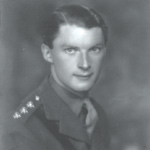|
Brigadier J P O’H Pollock MBE DL
Late Irish Guards
by Colonel J H O’H Pollock MBE
formerly Irish Guards
|
 Patrick Pollock was born in 1920 in Palestine where his father was a District Governor during the British Mandate; their address was the exotic sounding ‘The Residency, Nazareth’. Due to growing unrest between Jews and Arabs, he spent much of his childhood under the care of an eccentric aunt in Perthshire, at Glencalvie, where he developed a lifelong love of the Highlands, stalking and especially fishing. Patrick Pollock was born in 1920 in Palestine where his father was a District Governor during the British Mandate; their address was the exotic sounding ‘The Residency, Nazareth’. Due to growing unrest between Jews and Arabs, he spent much of his childhood under the care of an eccentric aunt in Perthshire, at Glencalvie, where he developed a lifelong love of the Highlands, stalking and especially fishing.
On the outbreak of war, as he turned 19, he left Sherborne giving up a place at Cambridge to join the Irish Guards. He was initially posted to the Training Battalion at Lingfield. In July 1940, the Battalion moved to garrison the Western Heights at Dover. Invasion was expected imminently and they were subjected to sporadic shelling, which earned the place the sobriquet ‘Hell Fire Corner’ in the press. The Battle of Britain was at its height. The first close encounter with the enemy was when an aeroplane flew low over the Heights. The Commanding Officer, The Viscount Gough, was furious that it was not engaged. Enquiry revealed that the Lewis gunners on air defence duty had been too busy saluting the officers heading into the mess for luncheon to be distracted. The Battalion did make amends for this lapse, later being credited with the destruction of two aircraft.
In 1941 Patrick joined the 2nd Battalion, billeted in Woking and manning anti-invasion fortifications. News soon arrived that a Guards Armoured Division was to be formed; they were to become 2nd (Armoured) Battalion Irish Guards and were rapidly scattered to various parts of the country to master new trades. Patrick found himself learning about tank gunnery and then becoming an instructor at Lulworth. As well as teaching, some of the instructors assessed captured German tanks against which they judged our machines to be technically grossly inferior. Detailed reports were sent to Parliament where it was hoped to expose the scandal and force the government to focus resources on tank development. However, the reports were suppressed and the authors admonished. Patrick went back to the 2nd Battalion, arriving during the final build up to D-Day. With them he fought through the gruelling battles in Normandy until, during Op BLUECOAT, the last major offensive in the bocage, where he was wounded, surviving thanks to the skill of Rip Ripman, the Regimental Medical Officer. Months of convalescence followed before he returned - to the 3rd Battalion.
He left the Army in 1946 and became, surprisingly, an ‘ad-man’. He launched Wrigley’s Spearmint Gum on an unsuspecting Switzerland, but found the commercial world uncongenial. He was invited to rejoin the Micks and did so with alacrity in 1952, and was posted to the 1st Battalion in Hubbelrath. He returned to London to take part in the coronation as a Gold Staff Officer (a posh usher). Shortly afterwards he went with the Micks to the Canal Zone. Although an operational tour, and the tented encampments were spartan, life was enlivened by sporting opportunities. Duck flighting forays came to an end when Patrick was selected to become Staff Officer to Lieutenant General Sir Richard Hull, the Chief of Staff of Middle East Land Forces in Cyprus. Eoka terrorism was building. He narrowly missed injury when grenades were thrown into a party at the Governor’s residence. His wife, Jane, was not so lucky, being hit by splinters. He subsequently completed further tours of regimental duty in England and filled various staff jobs in London and Germany, some with the intelligence service at the height of the Cold War; he was part of the team that ‘ran’ the agent Oleg Penkovsky, possibly the most significant spy the West had within the Kremlin. Naturally, when Penkovsky wanted to be photographed in British uniform to prove his loyalty, he was dressed as a Mick. His final tour was as Defence Attaché in Madrid. Diplomatic frostiness imposed by General Franco, because of Gibraltar, was compensated for by memorable partridge shoots and trout fishing expeditions. He was also engaged in an early attempt to re-introduce bustards to England, by helping to smuggle some of their eggs out of Spain. These were successfully incubated on Salisbury Plain.
After leaving the Army he worked for the Army Benevolent Fund and for the Order of St John and was a Deputy Lieutenant for Hampshire. Extramurally, whilst fishing was always his favourite pastime, he also enjoyed sailing, having cut his teeth on the Household Brigade’s 50 square metre windfall yacht Gladeye. In the 1950s she was engineless and enjoyed a somewhat infamous reputation due to the frequency with which she needed to be rescued when becalmed.
He was married first to Jane Denham in 1951, with whom he had a daughter and two sons, one of whom also served in the Regiment. He married, for the second time, in 1976, Phoebe Hill, née Pemberton, who survives him.
|
|